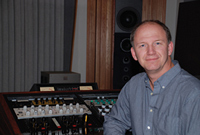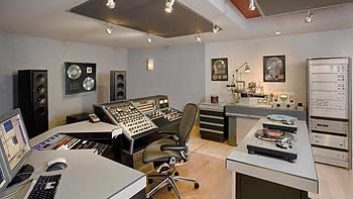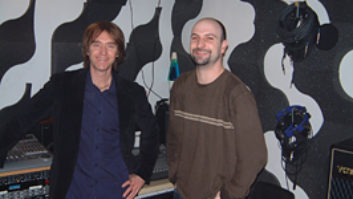
Scott Hull: new owner of Masterdisk
If things seem hectic for New York City’s major recording studios, imagine what it’s like to be in the mastering sector that depends on them. The past year has been a maelstrom of rearranging, with a fleet of facilities closing down, others changing hands, some opening, engineers being bounced around the boroughs like beach balls.
First the bad news: The official out-of-action list includes Classic Sound, Frankford Wayne, Jigsaw Mastering and Sony Mastering. In the gray zone is TruTone, which has moved to New Jersey while its former Manhattan headquarters is currently being renovated and is expected to be the new home for some Sony survivors. Openings include Tangerine Mastering, Meyer Media Mastering, James Cruz’s Zeitgeist Sound Studios and Drew Lavyne’s room within Germano Studios. The vaunted Masterdisk has changed hands following Scott Hull’s acquisition of its equipment and lease. Meanwhile, some mastering engineers are also going it alone and putting Manhattan in their rear-view mirrors.

The new Joe Lambert mastering studio
As mastering is the last stop in the signal path, it makes sense that New York City’s facilities are in a spin following the well-documented woes of the recording studios that feed them. “New York City rent is just astronomical — it seems to be tripling at a quicker rate than it was ever even doubling before,” says Hull. “But this is where the work is. This is where people want to come to sessions, and for me staying in Manhattan was the only option.
“So the challenge is to find enough clients to go beyond expenses. What I’ve been trying to do is be more efficient, be more productive with the time and down time I have, continually network and find new revenue streams. It’s a combination of all those things that make it work.”
In addition to taking over Masterdisk’s (www.masterdisk.com) longtime West 45th Street location from longtime CEO Doug Levine, Hull retained the Times Square site of Scott Hull Mastering and asked New York City cornerstone Howie Weinberg to helm it as Masterdisk 321 (for 321 W. 44th St.). “I felt that Masterdisk was a flagship mastering studio that could be rejuvenated to be as profound as it once had been,” says Hull, who began his career as an assistant at Masterdisk in 1983. “We’re working toward a multiple-engineer-per-room model, which is a major change. It’s more about time-sharing than it is after-hours, and it requires selecting certain types of people who are cooperative, but so far it’s working well.”
Time-sharing probably won’t be on the docket anytime soon for Joe Lambert (www.joelambertmastering.com), who is now on his own in Brooklyn and loving it after stints at TruTone and Classic Sound. “Even when the studios were busy, it was always stressful,” he recalls. “I thought that I didn’t see a future in the mastering factories — the real estate in Manhattan is way too expensive. If Sony can’t afford to stay open, I don’t know how anyone can.”
After TruTone went into limbo — and his suite along with it — Lambert felt confident that his following would support his very own room in Brooklyn, where he saw a still-expanding client base and a palpable energy. Building a room in Brooklyn’s DUMBO (Down Under Manhattan Bridge Overpass) section with the help of Francis Manzella and Kay Hoight of Taytrix, Lambert feels like he’s finally at home. “The bulk of the people that I work with are already in Brooklyn,” he says. “Rent here is one-third of Manhattan, and it’s the first stop on the F train — if you’re downtown, it takes less time to get here than to Midtown. So I’ve gone on my own where I could have a smaller boutique mastering studio, have the same room and experience and value for the clients, and do it in a place that isn’t costing so much.”
However, one of the longtime big kids on the block, Sterling Sound (www.sterlingsound.com), believes that its move to large Manhattan quarters 10 years ago was a sound decision that continues to pay off today. “I’d put luck into the way that things have unfolded, but having a big staff and a big facility has been incredibly valuable to us,” says Murat Aktar, president of Sterling Sound. “It allows us to make investments in developing equipment, and over the last two years we’ve done a lot of development on software, internal project management, recording systems and file-transfer systems.”
Even as the cityscape continues to roil, Aktar points out that it’s the people who drive mastering in New York City and beyond. “The businesses that are successful will rely on the creative draw and reputation of their mastering engineers, so that hasn’t changed. They’ll continue to do well because when you look at the transaction cost for a mastering session compared to the kind of comfort you get from someone experienced working on your project, it’s not that much of a stretch.”
Send New York news to
[email protected]



